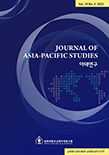유럽연합의 대북한 정책
The European Union's North Korean Policy: the rationales of the soft-security policy approach
- 경희대학교 국제지역연구원
- 아태연구
- 제15권 제1호
-
2008.0541 - 55 (15 pages)
- 4

유럽연합의 한반도 정책에 대한 동인을 확장이란 내부적 변화의 축에서 접근하는 것이 목 연구의 목적이다. 이런 전체적 테마 속에 본 연구는 확장을 거듭하고 있는 유럽연합의 대북한 정책을 시행함에 있어 그 동인이 무엇인지를 고찰하였다. 특히 본 연구는 학제적 통념들을 바탕으로 제시 된 설명 변수의 미흡함을 보완하고자 했다. 따라서 최근 확장의 하나의 특질로 사려되는 소규모 국가의 증가가 실제 유럽연합의 공동외교안보정책 형성 과정에서 어떻게 영향을 미치는지를 고찰하기 위해 정체성이나 이해관계를 중시하는 구성주의적 논의를 펼쳤다. 이런 접근을 통해 기존의 정부간주의적 특질을 바탕으로 한 공동외교안보정책의 이해와 이에 근거한 대북한 정책의 설명의 한계성을 보완하고자 한다.
The aim of this paper is to examine the driving forces behind the EU's North Korean policy, not least when the recent rounds of enlargements appear to have particular policy implications. It is against this backdrop that this paper attempts to provide an additional explanatory variable to make sense of the EU's North Korean policy. There is a conventional approach built on the intergovernmentalist perspective which accounts for the soft security approach adopted by the EU. Given the difficulties in ensuring the cooperation among the member states in terms of foreign and security polcy, it is evitable to undertake a soft security policy, which is much easier to muster agreement among members. However, this approach is challenged by using constructivist view, which is used to put the role of small states into perspective when the CFSP is socialized among the member states.
Ⅰ. 서론
Ⅱ. 유럽연합의 대북정책의 변천사
Ⅲ. 이론적 논의
Ⅳ. 확장과 공동외교안보정책: 정부간주의적 시각과 설명
Ⅴ. 구성주의적 접근: 공동체 안보정체성의 수렴과 확산
Ⅵ. 결론
참고문헌
(0)
(0)